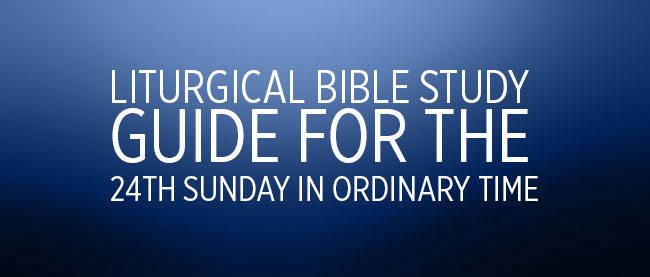1st Reading – Sirach 27:30-28:9
Sirach is one of the few books of the Old Testament where there is no question about the identity of the author. This book was written by one man: Jesus, son of Eleazar, son of Sira, who signed his name to the book.
The book has two names: Ecclesiasticus (which means “church book”), and the bookof ben Sira (or more simply, Sirach) after the author whose grandfather seemed to enjoy more prominence,
Born and raised in Jerusalem, Sirach was a highly respected scribe and teacher, aman of culture and means, who traveled much in his life; possibly as a diplomatic emissary to foreign courts. In later years he ran a school in Jerusalem, imparting to youth his deep knowledge and love of the Scriptures as well as the practical wisdom he had acquired empirically.
Scholars agree that the book was written 195-169 B.C., most probably about 180. It is the only book in the Bible with a forward, written by the author’s grandson, which although not considered inspired writing, is always included. This forward contains the first explicit mention of the Hebrew Bible’s three-fold division of scriptures (Law, Prophets, Writings). The third division is described somewhat vaguely, indicating that it has not as yet been fully delineated.
Sirach’s book is essentially an apology for Judaism. Written to defend the religious and cultural heritage of Judaism against the challenge of Hellenism, Sirach sought to demonstrate to his fellow Jews in Palestine and the dispersion, and also to well-meaning pagans, that true wisdom resides in Israel.
Sirach is one of the seven deuterocanonical books; it did not fit into the theology of the Pharisaic part of Judaism, which is responsible for fixing the Jewish canon. The book was generally well received in Judaism as is evident from its use in Jewish worship and literature. Its rejection from the Jewish canon may have been partly because of its recent date, but the chief reason is probably that it was associated with Sadducean literature.
Sirach was no Sadducee, but the tone of the work with its preoccupation with cult, the lack of any appreciation for the afterlife, and minimal messianism put it in a class with later Sadducean tenets. The Church, however, has always regarded the book as canonical. Not only is its influence seen in the New Testament, but its canonicity is more frequently attested by the Church Fathers than many protocanonical books.
In our first reading today we are told that deceit and dishonesty will lead one only to isolation. The wise man will not seek vengeance when wronged (see Matthew 6:12; 18:23-25), but will be faithful to mercy, as the Lord.
2nd Reading – Romans 14:7-9
Today we end our study of Paul’s letter to the Romans. We end this study with a reminder of what Jesus’ sacrifice on the cross means for us.
Gospel – Matthew 18:21-35
Last week we heard Jesus’ teaching on how to handle a fellow Christian who has sinned against us – first talk with him privately, if this doesn’t bring results, bring along several witnesses; if all this fails, bring him to the Church and if he fails to heed even the Church (something which is unheard of), treat him as one who is excommunicated, no longer a member of the community. This week we hear about the fellow Christian who, though he repents, continues to sin.


